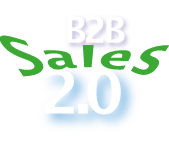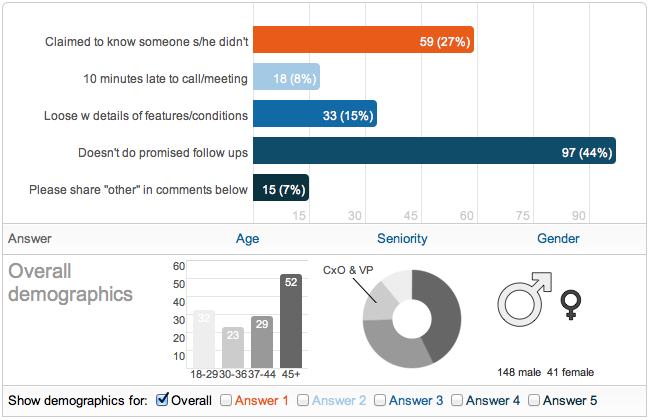Top B2B Salesperson Trust Killers Revealed discusses the results of targeted B2B sales research I conducted on LinkedIn and features comments from many survey respondents.
One of the key takeaways of The Dynamics of Change video was trust’s importance to B2B prospects’ risk management practices. To explore trust’s importance to B2B sales, I surveyed dozens of seasoned B2B sales executives, including clients and salespeople, in this LinkedIn Poll. The results reveal the nuances of trust and how salespeople must constantly challenge themselves to focus on trust, relationship and execution. For example, respondents said that too many salespeople fumble the ball on fundamentals.
B2B sales is a challenging proposition in normal times, but the challenging global economic malaise has only made budgets tighter and sales more daunting. In large B2B deals, salespeople have to build a significant level of trust with prospects before any deal can be done. This analysis aims to help firm executives and sales leaders improve performance by increasing trust with prospects and clients.
Key Findings
The biggest “trust killer” was overpromising and underdelivering. 44% of respondents said that salespeople failed to follow through on actions they promised. Most assume that the salesperson is most responsive before the deal is done, so promising and not delivering is a death knell during the courtship.
The second biggest disqualifier was most directly related to trust: 27% cited salespeople for claiming to know someone that they really didn’t know. In this age of electronic communications, it’s so easy for prospects to verify claims when salespeople try to chum up under false pretenses.
Interestingly, the third trust killer (15%) was being loose with product/service details and features. If you think about it, this speaks volumes: prospects are interested in the salesperson and other “soft” aspects of the proposition because they can probably get details online. Old school salespeople who try to depend on hawking product/service details are barking up the wrong tree.
Only 10% of respondents listed “being 10 minutes late” was a significant trust subtractor. However, this response ranked much higher among female respondents than any of the others, which suggests that women may have higher standards for timeliness.
Comments
Respondent comments revealed the nuances of trust, which are organized by key themes, having a true client focus, how considerate the salesperson is and integrity. Also note that respondents hailed from all theaters and most continents, which suggests how pervasive these behaviors are.
Firm-first vs. Client-first
Many salespeople may not realize it, but they primarily think of the client as the means to an end, to meet their quota. Everyone talks the talk that s/he is client-focused, but few walk the walk, as these trust killers reveal..
- “TELLING a prospect what they need or want instead of discovering through multiple questions what the prospect wants or needs.” – Philippe Lavie
- “I quickly vet out whether this sales person truly wants to be a trusted adviser, trying to solve a problem within my budget or someone who is simply selling me something to make their quota. A true test is weather they are willing to walk away if it’s not a good fit. It’s that person I would take phone call from in the future.” – Mathew Murphy
- “Coming on too strong without taking time to build a trust feature to the relationship “ – Peggy Molloy
- “.. exaggerated claims or pushing a “solution” before s/he has heard all the pertinent facts about the problem” – David Champion
- “.. didn’t bother to find out about my business needs – including business development stage, future proofing requirements and my customers, but just wanted to push their product/service at me regardless of fit” – Carolyn Johnson
- “The other big issue is that they are not prepared for a meeting. They come across as not knowing who I am.. I do not expect them to know everything, but they should be professional and let me know that they will find out the answer and get back to me in a timely manner.” – Marc O Goodman
- “Can I look across the table at the salesperson before and after I close the deal and know that they will be there as my advocate long term?” – David LaRue
Consideration
Respect for the client/prospect’s time and attention is a key element of “trust body language” because it is unconscious in most cases, and it reflects the salesperson’s attitude toward the relationship. If the salesperson claims to be serving the client, s/he needs to consider the client first. Too many salespeople fail this test..
- “Few things are sadder than a sales professional who manages to get past the gate keeper and actually get me on the phone only to make it painfully clear they know nothing about me” – Paul Bryant
- “I look for evidence for the way they will serve in the way they sell. I’d much rather buy than be sold to. So if they haven’t done their homework and aren’t prepared to deliver some level of value in that first meeting, then I’m skeptical of the ultimate fit.” – David Ormesher
- “.. the client is the firm, not “the man.” However, it is usually the man approving the sale. Sometimes you need to allay the man’s fear to bring success to the client. Sometimes you have to work for the client past the man in order to retain the client when the man leaves..” – Richard A. Whipple
- “The “10 minutes late to a call or meeting” is significant for me since my schedule is orchestrated so tightly every day,” – Kathryn Neal Odell
- “.. it is very easy for a salesperson to see himself/herself as a teacher. Customers want information [but that] does not automatically imply they want to be taught” – Steve Coltman
Integrity and Trust
The relationship between salesperson and client is cooperative and perhaps collaborative, but each has different motivations and definitions of success that are “aligned” in the best case. When circumstances arise that benefit one party at the “expense” of the other, how the salesperson deals with the situation is relationship-defining. Lying is, in most cases, an attempt to avoid conflict. Therefore, it prevents enduring solutions and building relationships.
- “I would say anything close to lying is a killer. By killer I mean ‘get out and never show up anymore please.’” – Bernard Noel de Burlin
- “if the client does not have my trust and if I do not have theirs, I feel I have let them, and myself, down..” – Nib Khan
- “Lying to customers..” – Helga Wandel
- “Everyone gets caught in traffic, we can all make mistakes about describing something we may know very well, and I have to admit I’ve forgotten to follow up on a few things.. these are sins of omission. But claiming to know someone you don’t know is definitely a sin of commission!” – Jane Ranshaw
Insights
- The context for the responses was offline, but respondents’ comments apply equally to interacting online. Without realizing it, salespeople broadcast how client-focused they are while they are interacting online. A smart crowd figures out quickly, and interactions expose fakes.
- Online “body language,” like its offline cousin, represents unconscious signaling of unspoken (and often true) attitude or motivation. To be most effective, sales executives treat root causes rather than tactical fixes. Make sure rewards and philosophy reward client-focused salespeople.
- Salespeople can demonstrate online their prowess at the #1 failure point—the ability to follow up—far more inexpensively online by making and fulfilling commitments.
- Similarly, salespeople can show their integrity online by having the confidence to take risks in discussions and admit when they are unsure or wrong.
- Demonstrating trustworthy behavior is the key to developing trust and relationships online.
What is your biggest trust killer?



[…] post Top B2B Salesperson Trust Killers Revealed appeared first on Christopher S. Rollyson and […]